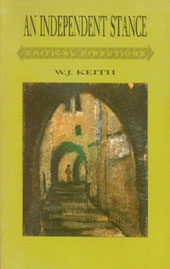The Porcupine's Quill
Celebrating forty years on the Main Street
of Erin Village, Wellington County
BOOKS IN PRINT
An Independent Stance by W. J. Keith
Part One of this strongly worded, informed, and wide-ranging collection examines key issues for the future of Canadian criticism. Part Two offers new readings of important works by Grove, Wilson, MacLennan, Davies, Laurence, Hood, Wiebe, Hodgins, and Atwood. As W.J. Keith argues, ‘We still have a mission: to have our literature recognized as an essential reflection of our national life. This is what I mean by retrenchment and consolidation. Literature can survive without literary criticism but it cannot survive if it is unknown and unread. It is criticism’s prime function at the present time to see that it is both known and read with that mature enjoyment which is a combination of emotional sensitivity and humane intelligence. As critics, scholars, editors, we shall not be fulfilling our responsibilities or justifying our existence if we attempt anything less.’ Or as Keith modestly observes in his introduction to this collection, ‘If this book is of any interest, it will be because Canadian literature is an important subject. Literary commentators like myself are middle-men, and should be prepared to admit the fact. If this book succeeds in helping readers to appreciate the works of Canadian writers that I discuss, and to derive increased pleasure and insight from them, it will have served its purpose. I can see no other justification for it -- or for any other work of criticism.’
Table of contents
On the Need for an Independent Stance
Part One: Criticism
Canadian Literature, Criticism, and Evaluation:The Literary History of Canada
The Thematic Approach to Canadian Fiction
Poet as Critic: Louis Dudek
Atwood as (Infuriating) Critic
The Function of Canadian Criticism at the Present Time
The Quest for the (Instant) Canadian Classic
The Post-Modernist Phenomenon and Canadian Literature
‘Criticism in Practice’: John Metcalf’s Private Part
Part Two: Fiction
The Art of Frederick Philip Grove: Settlers of the Marsh as an Example
Overview: Ethel Wilson, Providence, and the Vocabulary of Vision
Novelist or Essayist?: Hugh MacLennan and The Watch That Ends the Night
The Roots of Fantasy: Document and Invention in Robertson Davies’s Fiction
The Not-So-Divine Comedy of Robertson Davies
Margaret Laurence’s The Diviners: The Problems of Close Reading
’Layer on Layer’: A Reading of Hugh Hood’s A New Athens
The Case for Hugh Hood
Two Reviews of Rudy Wiebe
1. The Mad Trapper
2. Sex and the Dead
Jack Hodgins and the Sources of Invention
Hodgins’s ‘Pack of Crazies’: The Resurrection of Joseph Bourne
On the Edge of Something Else: Jack Hodgins’s Island World
Interpreting and Misinterpreting ‘Bluebeard’s Egg’: A Cautionary Tale
Works Cited
Index
Biographical Note
Review quote
‘The study of English literature (and, by forced alliance, Canadian literature) is beset by ‘‘isms’’. Critical obfuscation is rampant. And the secondary text, not the primary, is now idolized. But here and there a reactionary voice is heard, and none more powerful and insistent than that of Keith, whose stance, though independent, is thankfully not unique. Eloquently and lucidly urging the validity (even necessity) of evaluative and formalist criticism -- paying attention to the primary text, its artistic ‘‘making’’ and its artistic value (what it says about life) -- Keith offers eight essays on critical theory and practice, and a further thirteen on a variety of Canadian writers, in all of which the argument for the ‘‘inevitability of evaluation’’ is ‘‘consistently and conspicuously’’ made.
‘This is a diverse set of essays, most of them previously published, which may be read individually as commentaries on Louis Dudek, Margaret Atwood, John Metcalf, Philip Grove, Ethel Wilson, Robertson Davies, Margaret Laurence, Hugh Hood, and Jack Hodgins; or together as a manifesto on modern Canadian criticism and literature. Either way, the reading is a salutary experience whose conclusion is summed up in Keith’s essay on Atwood’s Bluebeard’s Egg: ‘‘We need to approach literature not with made-to-measure theory but with a flexible, verbally sensitive critical practice that attempts, tentatively, humbly, sometimes painfully, to develop a tradition of close and accurate reading.’’ This is not, as I’m sure Keith would agree, a plea to ignore history, biography or cultural milieu, but rather one that urges the paramount importance of the primary text.’
—R.G. Moyles, Canadian Book Review Annual
W. J. Keith was born and raised in England. He came to Canada in 1958 where he taught at McMaster (1961-66), then at the University of Toronto (1966-95). Since 1995 he has held the position of Professor Emeritus of English at University College, University of Toronto.
W. J. Keith edited the University of Toronto Quarterly (1976-85), and was elected a Fellow of the Royal Society of Canada in 1979.
An updated version of Canadian Literature in English was published in 2006.
The Porcupine's Quill would like to acknowledge the support of the Ontario Arts Council and the Canada Council for the Arts for our publishing program. The financial support of the Government of Canada through the Canada Book Fund (CBF) is also gratefully acknowledged.





